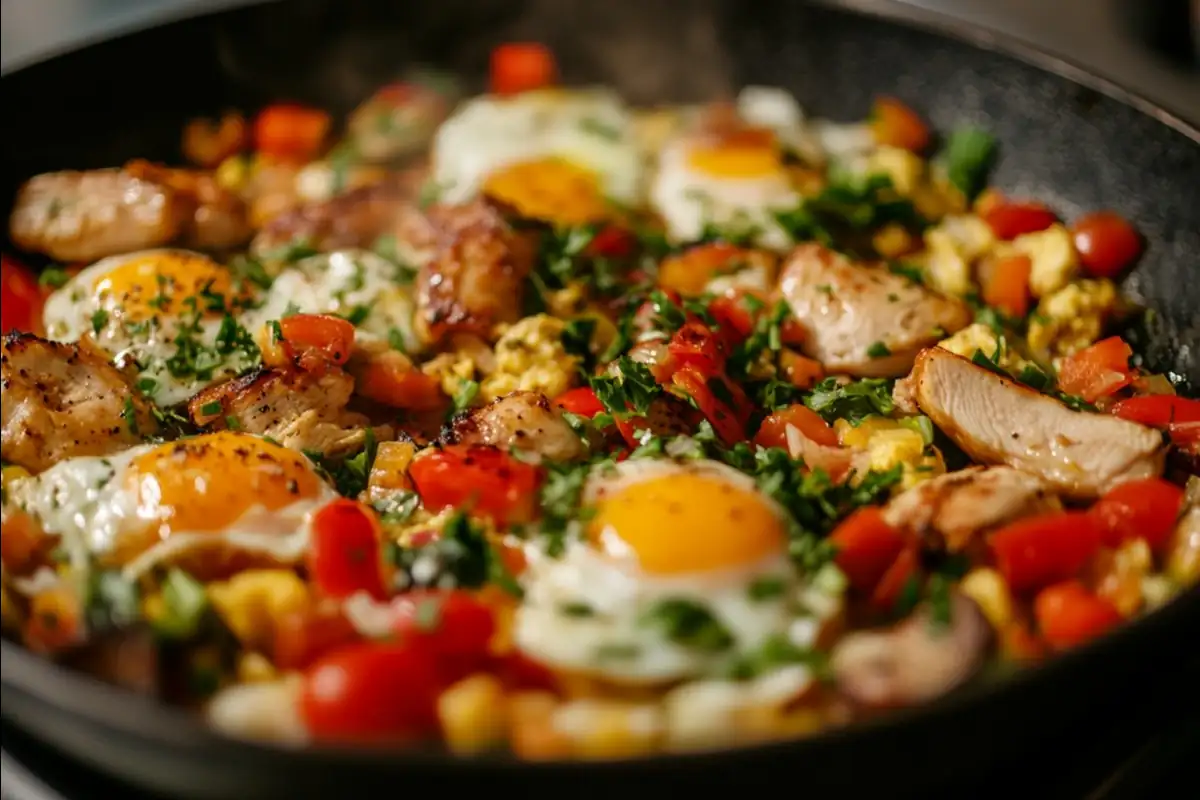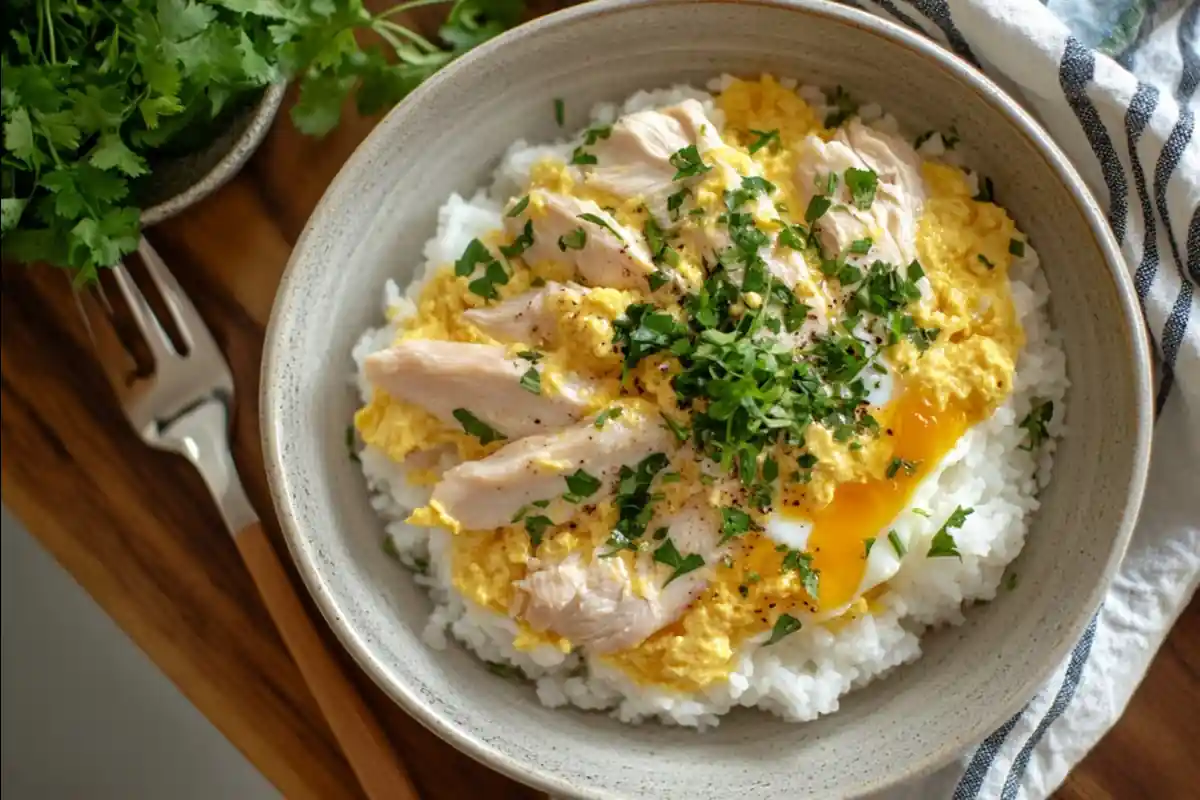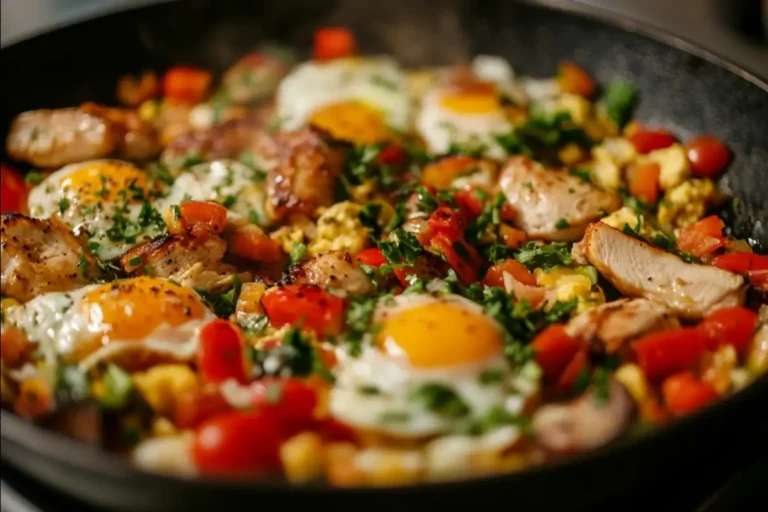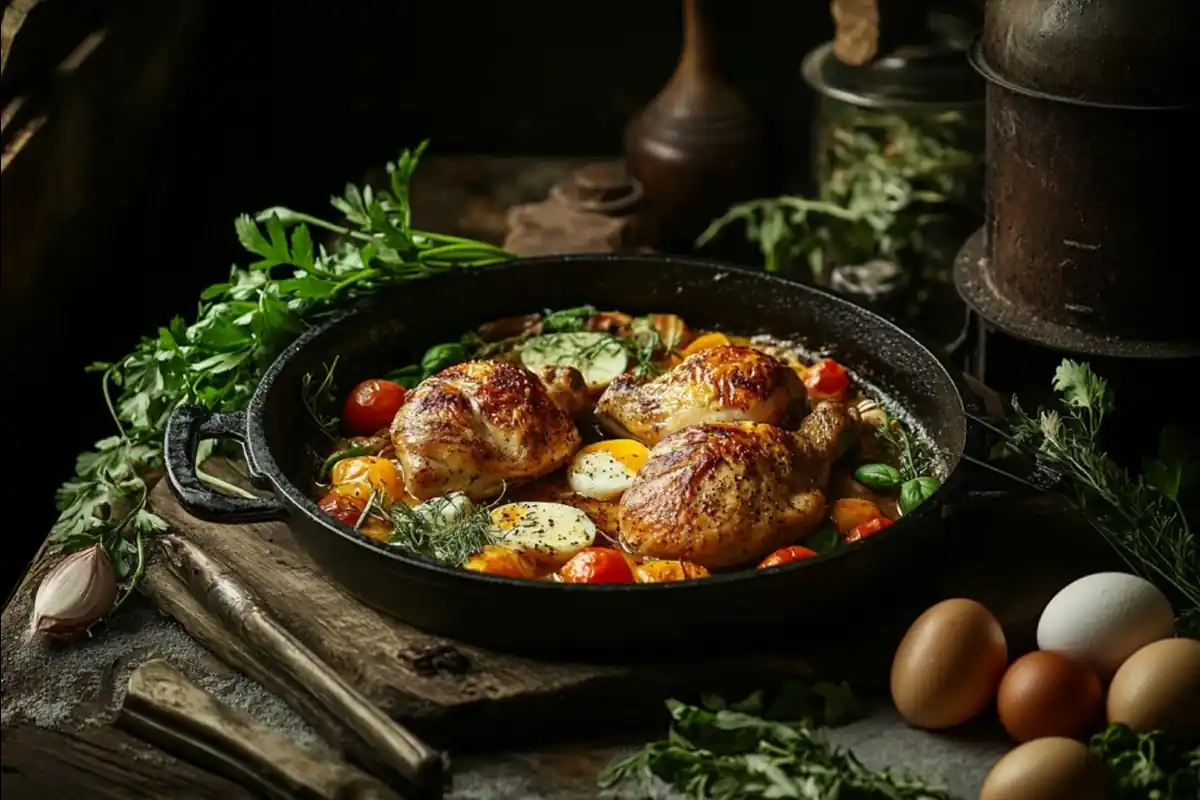1: The Basics of Chicken and Eggs
Why Chicken and Eggs Are Staple Ingredients
Do chicken and eggs go together? This question is common among food lovers and nutritionists alike. Absolutely! Do chicken and eggs go together in everyday meals? Yes, they are consumed globally and are among the most versatile ingredients in any kitchen. Cooks celebrate both ingredients for their versatility, nutritional benefits, and complementary roles in various cuisines.. Combining chicken and eggs in meals creates a flavor profile that is both hearty and satisfying.
Nutritionally, chicken is known for being an excellent source of lean protein. It is rich in essential amino acids, B vitamins, and minerals like phosphorus and selenium. Eggs, on the other hand, are a treasure trove of nutrients, providing high-quality protein, healthy fats, and important vitamins like A, D, and B12. Together, they form a dynamic duo that supports a balanced diet.
Furthermore, these ingredients are staples in everyday cooking due to their adaptability. Whether it’s a quick breakfast scramble or an elaborate dinner casserole, chicken and eggs can elevate any dish with their unique textures and flavors.
Versatility in Cooking
One of the reasons many people ask, ‘Do chicken and eggs go together?’ is because of their incredible versatility in recipes. These two ingredients shine in both simple and complex preparations. These two ingredients shine in both simple and complex preparations:
- Simple Dishes: Think grilled chicken breast topped with a fried egg, or poached eggs served over shredded chicken in a warm broth.
- Complex Dishes: Recipes like chicken and egg fried rice or Japanese oyakodon showcase their compatibility in more intricate cooking styles.
Their adaptability extends beyond flavor and caters to various dietary preferences, from keto to paleo diets. This versatility solidifies their place as kitchen essentials.
2: Exploring Culinary Pairings
Popular Dishes Combining Chicken and Eggs
Do chicken and eggs go together in different cuisines? Absolutely! Their complementary flavors and textures have inspired countless iconic dishes worldwide. Moreover, their harmonious flavors and versatile textures allow them to shine in a variety of recipes. For example, here are some standout examples:
- Chicken and Egg Fried Rice: A staple in Asian cuisine, this dish combines diced chicken and scrambled eggs with rice, soy sauce, and a medley of vegetables. It’s a quick, flavorful meal that can be customized with spices and seasonings.
- Oyakodon (Japanese Parent-Child Bowl): This comforting Japanese dish simmers chicken in a savory-sweet sauce and layers it with beaten eggs over steamed rice. The result is a warm, satisfying meal that balances umami and sweetness.
- Chicken Omelet: Fold shredded chicken into a fluffy omelet, and add cheese, spinach, or herbs to create a protein-rich breakfast or brunch option.
- Breakfast Burritos: Combining scrambled eggs and grilled chicken in a tortilla with cheese and salsa results in a hearty, portable breakfast that’s ideal for busy mornings.
- Chicken Caesar Salad with Poached Egg: This modern twist on a classic salad adds a poached egg for creaminess, enhancing the dish’s texture and nutritional value.
These dishes exemplify the culinary possibilities of chicken and eggs, whether for breakfast, lunch, or dinner.
Cooking Techniques for Chicken and Eggs
Do chicken and eggs go together in different cooking techniques? Yes! Their adaptability extends across multiple methods, from frying and baking to steaming and poaching. Here are some common cooking techniques that make the most of this dynamic duo:

- Stir-Frying: Quickly cook chicken and eggs together in a hot wok, often with vegetables and seasonings.
- Let me know if there’s anything else you’d like to adjust! This method preserves their textures while creating a flavorful, cohesive dish.
- Egg Breading for Chicken: Eggs act as a binding agent when breading chicken, creating a crispy, golden crust after frying or baking. The egg enhances the flavor and provides a satisfying crunch.
- Layering in Casseroles: Chicken and eggs often come together in casseroles, layered with cheese, vegetables, and other ingredients. This technique is ideal for meal prep and offers a warm, comforting dish for family dinners.
- Poaching Together: Poach chicken and eggs together in soups and stews to create a rich, protein-packed broth. This is especially popular in Asian cuisines, where the egg’s softness complements the chicken’s tenderness.
These methods highlight the adaptability of chicken and eggs and provide a framework for creating diverse and delicious dishes.
3: Nutritional Synergy
Protein Synergy and Health Benefits
Do chicken and eggs go together in terms of nutrition? Without a doubt! They create a powerful combination, offering high-quality protein, vitamins, and essential nutrients for overall health. Both are high-protein foods that provide essential nutrients for muscle growth, energy production, and overall health. Combining these two ingredients in a single meal creates a complete amino acid profile, which is crucial for repairing tissues, building muscles, and supporting the immune system.
For athletes and fitness enthusiasts, chicken and eggs are a go-to combination. A grilled chicken breast paired with two boiled eggs provides more than 40 grams of protein. This powerful combination delivers energy and supports recovery after workouts, making it ideal for those on high-protein diets.
Moreover, this pairing ensures sustained energy levels. While the protein from chicken is lean and long-lasting, the eggs contribute fats and additional nutrients that provide a steady release of energy throughout the day.
Comprehensive Nutritional Benefits
Beyond protein, chicken and eggs bring a wealth of other nutrients to the table:
- Chicken: A rich source of B vitamins, selenium, and phosphorus. These nutrients are essential for metabolic health, strong bones, and a robust immune system.
- Eggs: Packed with vitamin A, vitamin D, choline, and antioxidants like lutein and zeaxanthin, eggs support eye health, brain function, and overall wellness.
When consumed together, the combination amplifies these benefits. For example:
- Bone Health: The phosphorus in chicken complements the vitamin D in eggs, promoting stronger bones.
- Cognitive Function: Choline in eggs supports brain health, and the B vitamins in chicken help in energy production, enhancing mental clarity.
However, moderation is key. While these foods are nutritious, they also contain cholesterol, so individuals with specific dietary restrictions must monitor their intake. For those with cholesterol concerns, opting for egg whites and lean chicken cuts can be a healthier choice.
4: Cultural and Ethical Perspectives
Cultural Recipes Featuring Chicken and Eggs
Do chicken and eggs go together in traditional recipes? Across cultures, the answer is a resounding yes! These two ingredients are featured in countless traditional and modern dishes worldwide. Moreover, they are celebrated for their remarkable ability to adapt to local ingredients and cultural preferences, ultimately resulting in iconic dishes that perfectly showcase their compatibility.
- Asian Cuisine: In Japan, oyakodon symbolizes the harmony of chicken and eggs. Similarly, Chinese fried rice often includes chicken and scrambled eggs, creating a balance of flavors and textures.
- European Cuisine: French omelets with diced chicken and herbs are a staple, highlighting their simplicity and elegance. Meanwhile, Italian pasta dishes like carbonara may substitute pancetta with grilled chicken for a modern twist.
- American Cuisine: Breakfast combos, such as chicken sausage with scrambled eggs, have become classics in diners across the United States.
- Middle Eastern Cuisine: Shakshuka, a dish of poached eggs in tomato sauce, can be enhanced with spiced chicken for added protein and flavor.
These recipes demonstrate how chicken and eggs transcend borders, bringing people together through shared culinary traditions.
Ethical and Sustainable Considerations
As consumers become more conscious of their choices, ethical and sustainable practices in chicken and egg production have gained prominence. Let’s explore some key considerations:
- Sustainable Farming Practices: Many farms now prioritize free-range and pasture-raised chickens, ensuring better living conditions and reduced environmental impact. Eggs from these chickens are often richer in nutrients and taste better.
- Organic vs. Conventional: Organic chicken and eggs are free from antibiotics and synthetic hormones, making them a preferred choice for health-conscious consumers. However, they may be more expensive due to higher production costs.
- Animal Welfare: Ethical concerns about factory farming have led to a rise in humane certification programs. These programs guarantee that chickens are treated with care, with access to outdoor spaces and quality feed.
- Environmental Impact: Choosing locally sourced chicken and eggs helps reduce the carbon footprint associated with transportation and industrial farming.
By supporting ethical producers, consumers can enjoy chicken and eggs guilt-free while contributing to sustainable agricultural practices.
5: Practical Applications and Recipes
Chicken and Egg Recipe Inspiration
Do chicken and eggs go together in meal planning? Definitely! Their complementary textures and flavors allow for endless culinary creativity, making them essential for any kitchen. Whether you’re cooking breakfast, lunch, or dinner, these two ingredients can be the stars of any meal. Here are some recipes to inspire your next culinary adventure:

- Breakfast:
- Chicken and Egg Breakfast Burrito: Scramble eggs with shredded chicken, cheese, and salsa, then wrap it all in a soft tortilla for a portable, protein-packed breakfast.
- Chicken Omelet: Beat eggs and pour them into a hot pan, then add cooked, shredded chicken, spinach, and a sprinkle of cheese before folding.
- Lunch:
- Chicken Caesar Salad with Soft-Boiled Egg: Toss crisp romaine lettuce with grilled chicken, a soft-boiled egg, croutons, and Caesar dressing for a refreshing midday meal.
- Chicken and Egg Fried Rice: Sauté diced chicken and scrambled eggs with day-old rice, vegetables, and soy sauce for a quick, flavorful dish.
- Dinner:
- Oyakodon: Simmer chicken in a mixture of soy sauce, dashi, and mirin, then pour beaten eggs over the top. Serve over steamed rice for a hearty, comforting meal.
- Baked Chicken and Egg Casserole: Layer cooked chicken, eggs, cheese, and vegetables in a baking dish. Pour a mixture of beaten eggs and cream over the top and bake until golden and set.
Each of these recipes highlights the complementary flavors and textures of chicken and eggs, making them a hit for any occasion.
Cooking Tips and Safety Considerations
Cooking chicken and eggs together requires attention to safety to avoid cross-contamination and ensure the best flavor. Here are some essential tips:
- Handle Raw Ingredients Separately: Use separate cutting boards and utensils for raw chicken and eggs to prevent the spread of bacteria.
- Cook Thoroughly: Chicken should be cooked to an internal temperature of 165°F (74°C), while eggs should be cooked until the whites and yolks are firm.
- Add Eggs Last: In dishes like stir-fries and casseroles, add the eggs toward the end of cooking to preserve their texture and prevent overcooking.
- Season Strategically: Both chicken and eggs absorb flavors well. Marinate chicken before cooking and season eggs lightly to complement each other without overwhelming the dish.
By following these tips, you can create safe and delicious meals that showcase the best of chicken and eggs.
6: FAQs
Do chicken and eggs go together when eaten in the same meal?
Yes, chicken and eggs can be eaten together, and they complement each other beautifully in terms of flavor and nutrition. Many recipes, such as chicken and egg fried rice or oyakodon, highlight how well they pair. Their protein content and unique textures make them a balanced and satisfying combination.
What goes first, chicken or egg?
In most recipes, the cooking order depends on the desired outcome. For example:
-In fried rice, chicken is cooked first to ensure it’s fully cooked and flavorful before adding eggs.
-In breading techniques, eggs are applied first to the chicken to help the breadcrumbs adhere.
-In dishes like casseroles, eggs are added later to maintain their soft, fluffy texture.
The sequence often depends on the specific cooking technique and recipe requirements.
What should not be mixed with eggs?
While eggs are highly versatile, certain ingredients may not pair well with them:
–Overpowering spices like too much cumin or clove can mask their delicate flavor.
–Sugar-heavy ingredients may not work unless you’re preparing a sweet dish.
–Undercooked proteins, including chicken, should always be avoided for health reasons.
Stick to complementary ingredients like vegetables, herbs, and light seasonings for the best results.
What is the relationship between eggs and chickens?
The relationship between chickens and eggs is fundamental. For instance, chickens lay eggs as part of their reproductive cycle. In culinary terms, they represent a harmonious pairing, often referred to as “parent and child” in dishes like Japan’s oyakodon. Moreover, from a biological standpoint, chickens and eggs provide an interlinked source of protein, vitamins, and minerals, ultimately forming the backbone of many diets worldwide.
Can chicken and eggs be prepared for vegetarians or vegans?
Traditional chicken and egg dishes are not vegetarian or vegan. However, plant-based substitutes, such as tofu or chickpea flour “eggs” and mock chicken made from jackfruit or seitan, can recreate the flavors and textures of these ingredients for plant-based diets.
Do chicken and eggs go together for a healthy diet?
Eating chicken and eggs daily provides:
–Complete Proteins: Supporting muscle growth and repair.
–Essential Nutrients: B vitamins, choline, selenium, and antioxidants for energy and cognitive health.
–Sustained Energy: A balance of proteins and healthy fats that keep you full and energized.
However, moderation is key to avoid consuming excessive cholesterol or calories, depending on preparation methods.
Are there unique recipes where chicken and eggs are the main focus?
yes, some unique recipes include:
–Chicken Scotch Eggs: Hard-boiled eggs wrapped in seasoned ground chicken, breaded, and fried.
–Shredded Chicken and Egg Soup: A hearty broth with shredded chicken and poached eggs.
–Chicken Frittata: A baked egg dish with shredded chicken, cheese, and vegetables.
These recipes showcase the versatility of this combination in global cuisines.
7: Conclusion
Recap of Key Insights
Do chicken and eggs go together in a balanced diet? Absolutely! Their combination brings together nutrition, flavor, and versatility, making them an excellent choice for any meal. From cultural staples like Japanese oyakodon to universally loved dishes like fried rice, their compatibility shines in a variety of recipes. Nutritionally, they form a protein powerhouse, delivering essential amino acids, vitamins, and minerals crucial for maintaining energy, muscle health, and overall well-being.
Their adaptability extends to cooking methods, catering to simple weekday meals and complex gourmet creations alike. Beyond the kitchen, choosing ethically sourced chicken and eggs promotes sustainable farming practices, ensuring these beloved ingredients remain accessible and responsibly produced.
Now it’s your turn to bring the magic of chicken and eggs into your kitchen. Try one of the featured recipes, or experiment with your own creations! Whether you’re aiming for a quick breakfast or an elegant dinner, this versatile pairing is sure to delight.
Explore sustainable options, support local farms, and enjoy the incredible harmony of chicken and eggs in your meals. The possibilities are endless, and the results are always satisfying.
Print
Chicken and Egg Stir-Fry
Chicken and eggs are a classic culinary pairing, offering a protein-packed, flavorful dish that’s quick and easy to prepare. This Chicken and Egg Stir-Fry combines tender chicken, scrambled eggs, and crisp vegetables in a savory sauce for a delicious meal that’s perfect for lunch or dinner. Ready in under 30 minutes, this dish is ideal for busy weeknights while delivering restaurant-quality flavors.
- Total Time: 25 minutes
- Yield: 4 servings
Ingredients
For the Chicken:
- 1 lb boneless, skinless chicken breast, thinly sliced
- 1 tbsp soy sauce
- 1 tsp cornstarch
- 1 tsp sesame oil
- ½ tsp black pepper
For the Eggs:
- 3 large eggs
- 1 tbsp milk (optional, for fluffier eggs)
- ½ tsp salt
- ½ tsp sesame oil
For the Stir-Fry:
- 2 tbsp vegetable oil
- 1 red bell pepper, thinly sliced
- 1 small onion, sliced
- 2 cloves garlic, minced
- 1-inch ginger, grated
- 2 green onions, chopped
- 1 tbsp soy sauce
- 1 tbsp oyster sauce
- ½ tsp red pepper flakes (optional)
- 1 tsp honey or sugar (optional, for balance)
- Cooked rice, for serving
Instructions
- Marinate the Chicken: In a bowl, mix the chicken with soy sauce, cornstarch, sesame oil, and black pepper. Let it marinate for 10 minutes.
- Prepare the Eggs: In another bowl, whisk eggs with milk, salt, and sesame oil. Set aside.
- Cook the Chicken: Heat 1 tbsp of vegetable oil in a large skillet or wok over medium-high heat. Add the chicken and cook for 4-5 minutes until fully cooked. Remove and set aside.
- Scramble the Eggs: In the same pan, add a little more oil and pour in the beaten eggs. Scramble gently until just set, then transfer to a plate.
- Stir-Fry the Vegetables: Add the remaining oil to the pan, then sauté the bell pepper, onion, garlic, and ginger for 2 minutes.
- Combine Everything: Return the chicken and eggs to the pan. Add soy sauce, oyster sauce, red pepper flakes (if using), and honey. Stir well to coat everything in the sauce.
- Finish & Serve: Sprinkle with green onions, stir once more, and serve hot over cooked rice.
Notes
- Swap chicken breast for chicken thighs for juicier results.
- For extra flavor, add a splash of rice vinegar or hoisin sauce.
- Serve with cauliflower rice for a low-carb alternative.
- Prep Time: 10 minutes
- Cook Time: 15 minutes
- Category: Main Course
- Method: Stir-Fry
- Cuisine: Asian, Chinese-Inspired


4 thoughts on “Do Chicken and Eggs Go Together? The Perfect Culinary Pairing”